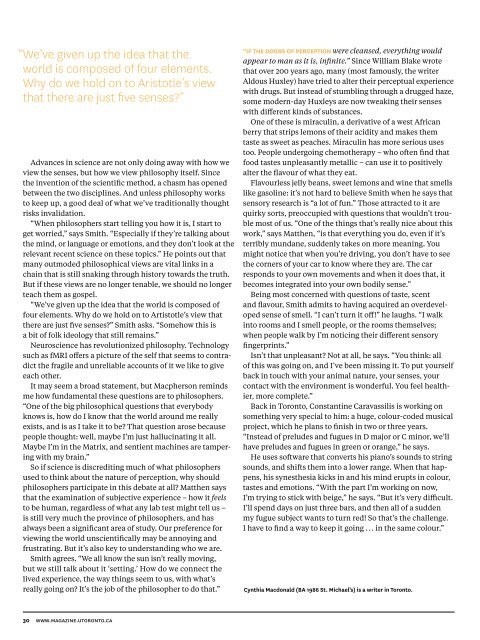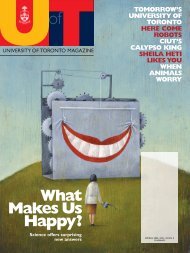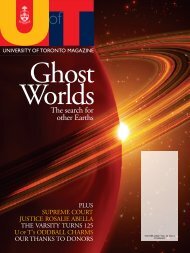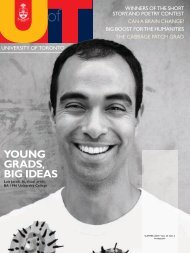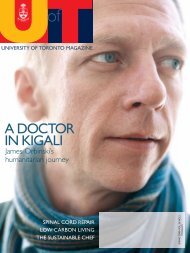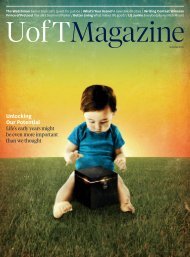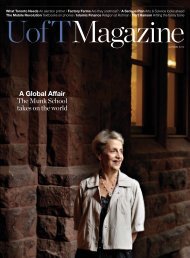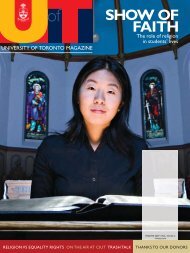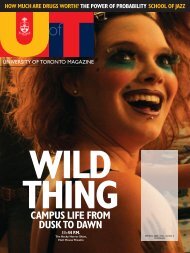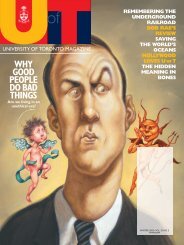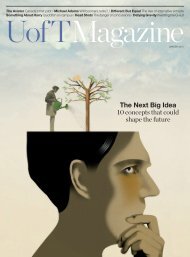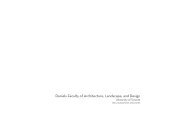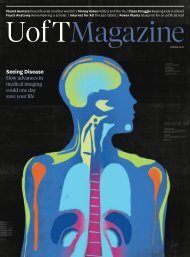8 MB - University of Toronto Magazine
8 MB - University of Toronto Magazine
8 MB - University of Toronto Magazine
- No tags were found...
Create successful ePaper yourself
Turn your PDF publications into a flip-book with our unique Google optimized e-Paper software.
“We’ve given up the idea that the<br />
world is composed <strong>of</strong> four elements.<br />
Why do we hold on to Aristotle’s view<br />
that there are just five senses”<br />
Advances in science are not only doing away with how we<br />
view the senses, but how we view philosophy itself. Since<br />
the invention <strong>of</strong> the scientific method, a chasm has opened<br />
between the two disciplines. And unless philosophy works<br />
to keep up, a good deal <strong>of</strong> what we’ve traditionally thought<br />
risks invalidation.<br />
“When philosophers start telling you how it is, I start to<br />
get worried,” says Smith. “Especially if they’re talking about<br />
the mind, or language or emotions, and they don’t look at the<br />
relevant recent science on these topics.” He points out that<br />
many outmoded philosophical views are vital links in a<br />
chain that is still snaking through history towards the truth.<br />
But if these views are no longer tenable, we should no longer<br />
teach them as gospel.<br />
“We’ve given up the idea that the world is composed <strong>of</strong><br />
four elements. Why do we hold on to Artistotle’s view that<br />
there are just five senses” Smith asks. “Somehow this is<br />
a bit <strong>of</strong> folk ideology that still remains.”<br />
Neuroscience has revolutionized philosophy. Technology<br />
such as fMRI <strong>of</strong>fers a picture <strong>of</strong> the self that seems to contradict<br />
the fragile and unreliable accounts <strong>of</strong> it we like to give<br />
each other.<br />
It may seem a broad statement, but Macpherson reminds<br />
me how fundamental these questions are to philosophers.<br />
“One <strong>of</strong> the big philosophical questions that everybody<br />
knows is, how do I know that the world around me really<br />
exists, and is as I take it to be That question arose because<br />
people thought: well, maybe I’m just hallucinating it all.<br />
Maybe I’m in the Matrix, and sentient machines are tampering<br />
with my brain.”<br />
So if science is discrediting much <strong>of</strong> what philosophers<br />
used to think about the nature <strong>of</strong> perception, why should<br />
philosophers participate in this debate at all Matthen says<br />
that the examination <strong>of</strong> subjective experience – how it feels<br />
to be human, regardless <strong>of</strong> what any lab test might tell us –<br />
is still very much the province <strong>of</strong> philosophers, and has<br />
always been a significant area <strong>of</strong> study. Our preference for<br />
viewing the world unscientifically may be annoying and<br />
frustrating. But it’s also key to understanding who we are.<br />
Smith agrees. “We all know the sun isn’t really moving,<br />
but we still talk about it ‘setting.’ How do we connect the<br />
lived experience, the way things seem to us, with what’s<br />
really going on It’s the job <strong>of</strong> the philosopher to do that.”<br />
“If the doors <strong>of</strong> perception were cleansed, everything would<br />
appear to man as it is, infinite.” Since William Blake wrote<br />
that over 200 years ago, many (most famously, the writer<br />
Aldous Huxley) have tried to alter their perceptual experience<br />
with drugs. But instead <strong>of</strong> stumbling through a drugged haze,<br />
some modern-day Huxleys are now tweaking their senses<br />
with different kinds <strong>of</strong> substances.<br />
One <strong>of</strong> these is miraculin, a derivative <strong>of</strong> a west African<br />
berry that strips lemons <strong>of</strong> their acidity and makes them<br />
taste as sweet as peaches. Miraculin has more serious uses<br />
too. People undergoing chemotherapy – who <strong>of</strong>ten find that<br />
food tastes unpleasantly metallic – can use it to positively<br />
alter the flavour <strong>of</strong> what they eat.<br />
Flavourless jelly beans, sweet lemons and wine that smells<br />
like gasoline: it’s not hard to believe Smith when he says that<br />
sensory research is “a lot <strong>of</strong> fun.” Those attracted to it are<br />
quirky sorts, preoccupied with questions that wouldn’t trouble<br />
most <strong>of</strong> us. “One <strong>of</strong> the things that’s really nice about this<br />
work,” says Matthen, “is that everything you do, even if it’s<br />
terribly mundane, suddenly takes on more meaning. You<br />
might notice that when you’re driving, you don’t have to see<br />
the corners <strong>of</strong> your car to know where they are. The car<br />
responds to your own movements and when it does that, it<br />
becomes integrated into your own bodily sense.”<br />
Being most concerned with questions <strong>of</strong> taste, scent<br />
and flavour, Smith admits to having acquired an overdeveloped<br />
sense <strong>of</strong> smell. “I can’t turn it <strong>of</strong>f!” he laughs. “I walk<br />
into rooms and I smell people, or the rooms themselves;<br />
when people walk by I’m noticing their different sensory<br />
fingerprints.”<br />
Isn’t that unpleasant Not at all, he says. “You think: all<br />
<strong>of</strong> this was going on, and I’ve been missing it. To put yourself<br />
back in touch with your animal nature, your senses, your<br />
contact with the environment is wonderful. You feel healthier,<br />
more complete.”<br />
Back in <strong>Toronto</strong>, Constantine Caravassilis is working on<br />
something very special to him: a huge, colour-coded musical<br />
project, which he plans to finish in two or three years.<br />
“Instead <strong>of</strong> preludes and fugues in D major or C minor, we’ll<br />
have preludes and fugues in green or orange,” he says.<br />
He uses s<strong>of</strong>tware that converts his piano’s sounds to string<br />
sounds, and shifts them into a lower range. When that happens,<br />
his synesthesia kicks in and his mind erupts in colour,<br />
tastes and emotions. “With the part I’m working on now,<br />
I’m trying to stick with beige,” he says. “But it’s very difficult.<br />
I’ll spend days on just three bars, and then all <strong>of</strong> a sudden<br />
my fugue subject wants to turn red! So that’s the challenge.<br />
I have to find a way to keep it going . . . in the same colour.”<br />
Cynthia Macdonald (BA 1986 St. Michael’s) is a writer in <strong>Toronto</strong>.<br />
30 WWW.MAGAZINE.UTORONTO.CA


